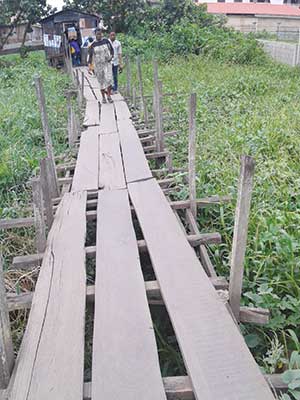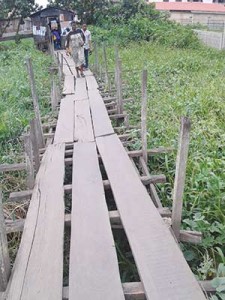Sewanu Kokude and Alex Smith have one thing in common: the desire to make life convenient in the outbacks of Lagos where they have erected makeshift bridges.
From tolls paid by users, these enterprising men in their early forties fend for their families. For them, no engagement can be more worthwhile.
Across the swamps in Okokomaiko, a footpath built with planks of hardwood takes a pedestrian from Casidy to the bustling Alaba International Market. The pedestrian pays N10.
If users of the bridge were to make the journey through alternative routes, that probably will cost more than N100 as transport fare, particularly for those who live and do businesses in that area.
Kokude and five others who operate the bridge said the motivation for building the plank footpath across the swamp is to provide thousands of users quick, cheap, and easy access to and out of the popular market from the Okokomaiko axis.
The bridge records an average 10,000 traffic to and fro. At N10 per person per crossing, that amounts to N100,000 per day.
Alex Smith has constructed a more formidable and motorable bridge that connects Okerube and Rabiat Ogendegbe Street in Akesan, a sprawling community off the busy Igando-LASU road.
The bridge, constructed a year ago, offers easy and time-saving access to and out of the insular communities of Okerube, Ijegun, and Abaranje whose only link is the Ijegun-Abaranje-Ikotun Road that is notorious for heavy traffic.
With the bridge in place, residents are relieved that they no longer have to navigate long distances to access the Iyana-Iba-LASU-Isheri Road.
Akesan residents and others coming from the Iba area of Lagos can easily access Okerube, Abaranje, and Ijegun through the link road without the stress of going through traffic gridlock.
A resident and commercial motorcyclist who identified himself simply as Babafemi said the money it costs to use the bridge is worth it.
Building plank bridges
Smith said he saw the need to erect the bridge for access to and out of Okerube and its environs, but it was not easy constructing the over 100-metre bridge across a swamp.
He had to do underground work to fortify the bridge, after constructing a drainage to channel water from the surroundings to a nearby canal.
“That alone gulped huge sums of money. We had to buy the plots of land on both sides, get permission from the local government, buy strong, heavy and durable planks and iron for cement casting,” Smith recalled.
“We have spent about N40 million to erect this bridge. We constantly do maintenance work on it to make sure it does not collapse. It is a lifetime business.”
Kokude’s plank bridge is much older, and it is only meant for pedestrians. “We don’t permit access to wheelbarrows and bikes.”
He has a chain bridges in other parts of Lagos which facilitate the movement of residents hemmed in by poor road networks in waterlogged areas.
This one was built in 1985 during the time of John Shagaya as Transport Minister.
“We have branches at Ajegunle; one is at Boundary and another is at Peoples, Apapa. Only the one at Ajegunle offers access to motor bikes because it is strong and has connection with the local government,” Kokude disclosed.
He said their operation is registered with the Lagos State government under the Lagos State Bridge and Canoe Transport Association, and they pay tax to the council.
“Before you become a member, you need to register. Our headquarters is at 5 Oyedeji Ajegunle. I am the Secretary of the association, Ojo branch. If any operator fails to register, our association has every right to dislodge them.”
Tolls across the bridges
Bridge users pay tolls regulated by the association. “It must not exceed what we have been advised to collect from users of the bridge.”
Pedestrians pay N10 as many times as they cross Kokude’s bridge a day. Those with load pay between N100 and N400 or more, depending on the weight and valuation.
He and his colleagues mount the toll point from the early morning hours, when the gate is open, till dusk. One collects the toll, others ensure orderly passage of traffic and compliance with payment requirements. The workers are paid from the proceeds.
Smith’s bridge attracts higher fares. It is more capital intensive, traffic is thin, and maintenance has to be regular to prevent its collapse.
Pedestrians pay N30 per crossing. Commercial motorbike and tricycle operators pay N100 to book for the day. Each pays additional N50 or more for every trip, depending on the number of passengers on board.
Car drivers pay N200. Jeep and bus drivers pay N250. It costs N500 if a vehicle conveys a load.
Smith, who is married with a daughter, said there are four of them on shift duty from 6am till 10pm when they close the bridge for security reasons.
On recouping his investment, he said: “It is a lifetime business so we don’t have to worry. Gradually, we will recoup the money and make some profit.”
Advice for the unemployed
Both entrepreneurs advised the unemployed to start little with whatever they have, stressing that small businesses have higher profit margins.
“There are little businesses people tend to overlook but that is where the money is. Sachet (pure) water business, for instance, fetches over 100 per cent profit per bag.
“Some people may think the money is little and therefore not attractive. But when you add it all up, you discover that you have accumulated a lot of gain,” Smith said.














